Acer Aspire S7 Ultrabook: Acer’s Best Foot Forward
by Jarred Walton on January 7, 2013 4:30 AM EST- Posted in
- Laptops
- Acer
- Intel
- Ivy Bridge
- Aspire S7
- Ultraportable
- Ultrabook
Battery Life and Thermals
With the performance aspects out of the way, let's turn to battery life. I have to say, I've run more battery tests on the Acer S7 than perhaps on any other laptop in recent history. It's not that it needed extra testing, but as the first Windows 8 laptop in our labs I wanted to look at changing some of the tests. We discussed things among the various editors, and I worked to come up with some redesigned, hopefully better battery life tests.
First on the chopping block is the idle battery life test; rarely do people use workloads that are so light that it's meaningful to look at pure idle battery life, and going to the extreme of muting the volume and turning off WiFi is more than most are willing to do. We've decided to move to our Internet test as the baseline measurement, since it's representative of a moderate workload that conceivably might be used while running a laptop on battery power. With moderate Internet surfing (we load four pages every minute, simulating time for reading) as our light workload, for our heavy workload we crank up the frequency of page loads (the same pages, only loading every 10 seconds now) and add in playback of a bunch of 128kbps MP3 audio files. Finally, for our heavy workload we keep the Internet portion of the moderate testing but add in looped playback of a 1080p H.264 encoded video and have a constant 1Mbps download running from a local server.
With this being the first laptop to use our new Windows 8 test suite, we're in a bit of a state of flux so I've run both the new battery tests along with the old Windows 7 era tests (only with IE10 instead of IE8/9). I also ran a few other battery life tests just for reference: the three PowerMark tests. We're a little hesitant to use PowerMark as a standard, simply because it's limited to Windows platforms and has the potential to encourage optimizations for a benchmark as opposed to general optimizations; as you'll see, however, there's plenty of overlap between our tests and the results from PowerMark.
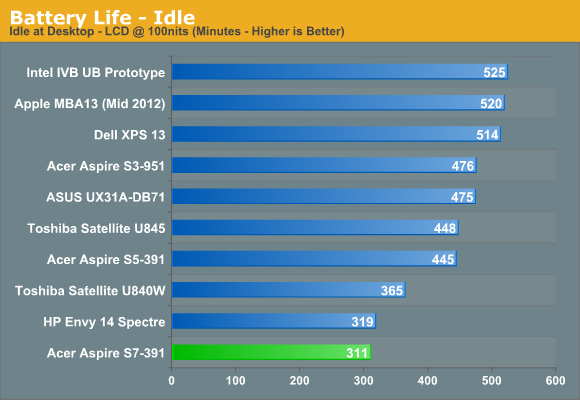
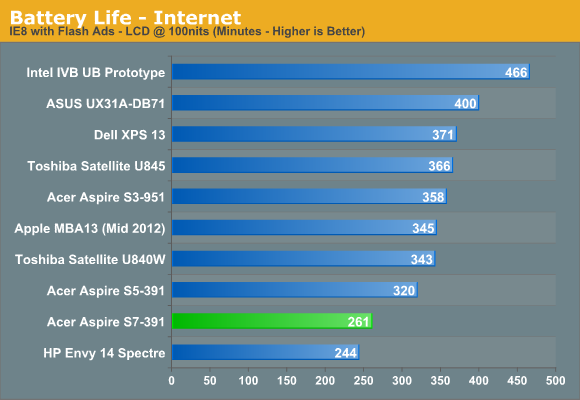
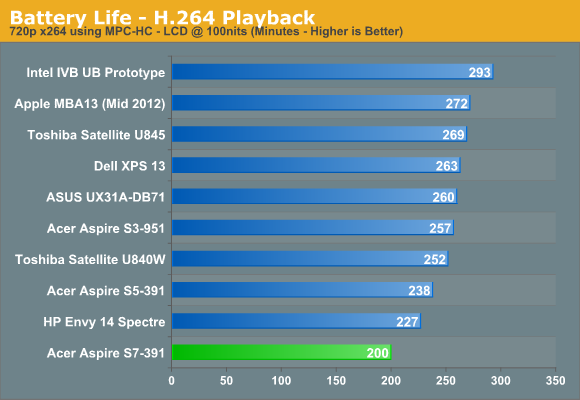
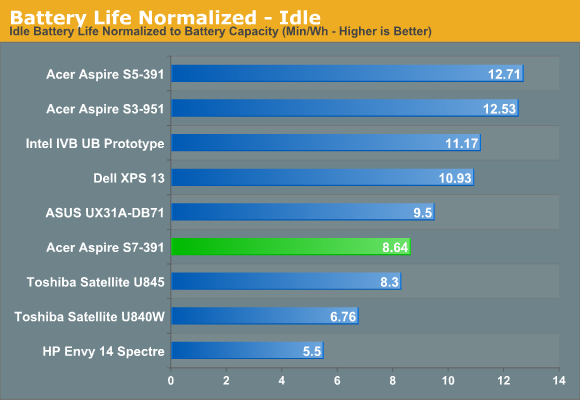
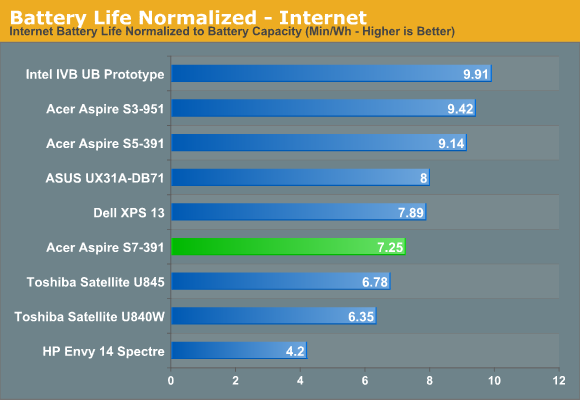
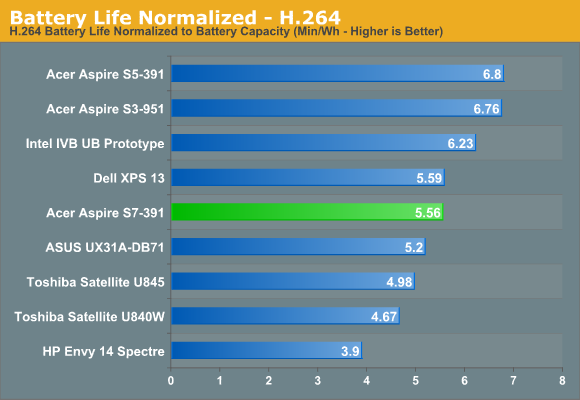
Starting with our older 2012 battery benchmarks, the Aspire S7 has a pretty poor showing. The 35Wh battery is the same capacity as the previous generation Aspire S5, and yet battery life is down substantially in all three tests. Whatever Acer (or Microsoft) has done in the past six months has not been helpful in this area. Normalizing for battery capacity does improve the situation a bit, but where it’s enough to move Acer past the two Toshiba Ultrabooks and the HP Envy 14, that’s not saying a lot—and higher battery capacities do count for something. The bottom line is that best-case, we were able to get just over five hours of running time out of the Aspire S7. Let’s look at some other results.
| Acer Aspire S7 Additional Battery Tests | ||
| Battery Test |
Run Time (Minutes) |
Normalized (Min/Wh) |
| AnandTech 2013 Light | 240 | 6.86 |
| AnandTech 2013 Medium | 173 | 4.94 |
| AnandTech 2013 Heavy | 137 | 3.91 |
| PowerMark Productivity | 255 | 7.29 |
| PowerMark Balanced | 201 | 5.75 |
| PowerMark Multimedia | 172 | 4.91 |
Note that in the above tests, we’re using 200 nits for our 2013 test suite while PowerMark specifies 110 nits as their desired brightness level. Our Light test result is down 21 minutes from our previous Internet test result, most likely due to the increased LCD brightness. Elsewhere, our new Medium test drops us below the three hour mark, and our Heavy test is getting close to lasting only two hours. It’s not really realistic to expect a full day of use from a laptop when you’re going full-tilt the whole time, but considering the CPU load is only around 10-35% even in our Heavy test, we’re not pushing things that hard.










53 Comments
View All Comments
mforce - Monday, January 7, 2013 - link
I find it seriously difficult to justify spending more than 500$ on a laptop. I don't make that much but even if I did ... I'm not really sure what justifies and over 1000 $ price for a laptop, it's just way too much.And the fact that it's an Acer doesn't help things much, let's face it, Acer doesn't really have a premium brand and it's not Apple. If I'll want to sell it right after I buy it I probably won't get more than 1000$ for it.
Besides even cheapo laptops often last quite a long time, I have an Acer I paid 400$ for and it's still running just fine 4 years later.
Romberry - Monday, January 7, 2013 - link
It's a conundrum eh? People like to complain that Windows-based notebooks aren't up to the build quality of Apple's MacBooks that go for well over a grand, but when confronted with a Windows-based notebook that rivals (or meets and in some cases exceeds) the build quality of Apple's MacBooks, the same crowd that bemoans the quality of the sub-500 dollar Windows machines balks.You can have cheap and (hopefully) acceptable, or you can have quality and the price that comes with it. If you're a 500 dollar and under laptop kind of person, then obviously this product is not for you.
Personally? I tend to agree that paying well over a grand for a laptop is very hard to justify for most people. I wouldn't do it. Example? I'm typing this post on an old (five years plus) Dell Inspiron e1505 running a Core Duo (not Core 2) processor , 1680x1050 display, 4 gigs of RAM and a 500 gig Hitachi hard drive with 32 bit Vista Ultimate. Bought two of these in May of 2007 for about 500 dollars a whack new from Dell on special, one for me and one for my daughter. Does everything I need it to do and is comfortable like an old shoe.
I have a Dell Latitude 6400 in the next room (Core 2 Duo P9600 at 2.66 GHz, 8 gigs RAM, 1920x1200 display, 128 gig Samsung 470 SSD primary drive, 500 gig WD Scorpio Black in the expansion bay in place of the optiical drive.) that I paid all of 400 dollars for off lease two years ago. (Added the SSD, upgraded the RAM and installed Win 7 x64.) It mostly sits unused because of the old shoe factor with the Inspiron.
Neither are sleek or easily portable, but they are functional, stable and reasonably fast for what I do with 'em.
I'm not sure just how big a market there is really for high end laptops. Apple sells a lot of MacBooks in terms of units, but in terms of overall market share...not that much. MacBooks are a niche. I think Winbooks built to these high standards are likely to be niche products as well, garnering about the same 3-5 percent share of the overall market as MacBooks. (Of course for many people I think those Apple MacBooks are as much a fashion accessory as they are a PC. Winbooks will likely never have that sort of purposeful snob appeal cachet. Then again, not everyone wants to be a snob.)
blue_urban_sky - Monday, January 7, 2013 - link
I agree with your statement about PC laptops not being able to win as they either feel cheap because they are or are too expensive. I would however like to draw some comparisonsGalaxy S3 ~ £400
iPad4 3g 64gb ~ £650
so £1000 for an ultra-book is not out of place, Don't get me wrong they are all expensive and products like the nexus range start to chalenge these premium prices.
Just so my bias is clear I own a S3, nexus 7 and brought my wife a yoga 13 for xmas as she is a dev and commutes with her laptop on the train so I wanted to find a nice light one. She loves it so money well spent.
mforce - Monday, January 7, 2013 - link
Sure but Nexus devices are cheaper and still quite good. And besides smartphones and tablets are all the rage these days , I don't think such a device can match that.Death666Angel - Monday, January 7, 2013 - link
200€ for a Nexus 7, 300-350€ for a Nexus 4, 400€ for a Nexus 10 and ~150-200€ for about any dual/quad A9 Chinese tablet and smartphone with specs similar to the current high end crop (800p, 1080p, 1200p ips screen @ tablet, 540p or 720p @ smartphone, 4-32GB NAND, 7.4Wh/25Wh batteries etc.). So I would argue that the prices you mention are just as overpriced.blue_urban_sky - Monday, January 7, 2013 - link
Although there is an argument that the high end products profits from manufacturers like Samsung, LG and Apple (tho indirectly) go toward the R&D of next gen hardware. I cannot see those same chinese manufacturers coming out with a flexible display until the tech is matured by one of the larger players at significant cost.Overpriced is strong term, as mentioned in the article the PC community have enjoyed a race to the bottom with little thought to anything other than Power/Price. I for one am glad that companies are looking to push toward aesthetics. If a Bugatti Veyron costs £2M, Aston Martin Vanquish costs £180k and Suzuki Alto costs £6k which one is better to get a pint of milk from the store in? and would you really like to live in a world where there is no "Wow"?
Death666Angel - Monday, January 7, 2013 - link
Then disregard the Chinese offerings, but a Nexus 7 at 200/250€, a Nexus 4 at 300/350€ and a Nexus 10 at 400€ still significantly undercut his listed devices while offering comparable to arguably better specs.As for the rest of your comment that car analogy has nothing to do with my comment and you are reading things into my comment that are clearly of your own mind.
blue_urban_sky - Tuesday, January 8, 2013 - link
The car comparison was just to illustrate that overpriced is highly subjective. The initial prices included the statement that the nexus range were challenging the sector, although google is not interested in profiting off these devices themselves.(http://crave.cnet.co.uk/mobiles/google-nexus-7-sel...
I would think that these ultrabooks are not big earners due to high development costs and low unit sales, So rather than overpriced I think that maybe they are just expensive.
mforce - Monday, January 7, 2013 - link
I was just saying that Acer can't expect people to pay as much for their brand as they do for Apple or Sony ( if you want Windows laptops ) and that's the reality. Given the choice almost anyone would choose an Apple or Sony product ... sure it may not be better and I know that but this is how it works.Also I find the touchscreen on a laptop a bit useless maybe, I don't find myself using it much. I'd rather have a mouse :D
blue_urban_sky - Monday, January 7, 2013 - link
Poor old Acer, If they are trying to up there game good on them I think they know it will be an uphill battle winning consumers over and maybe they have made a product that is very well made with quality parts for that very reason.... Maybe.